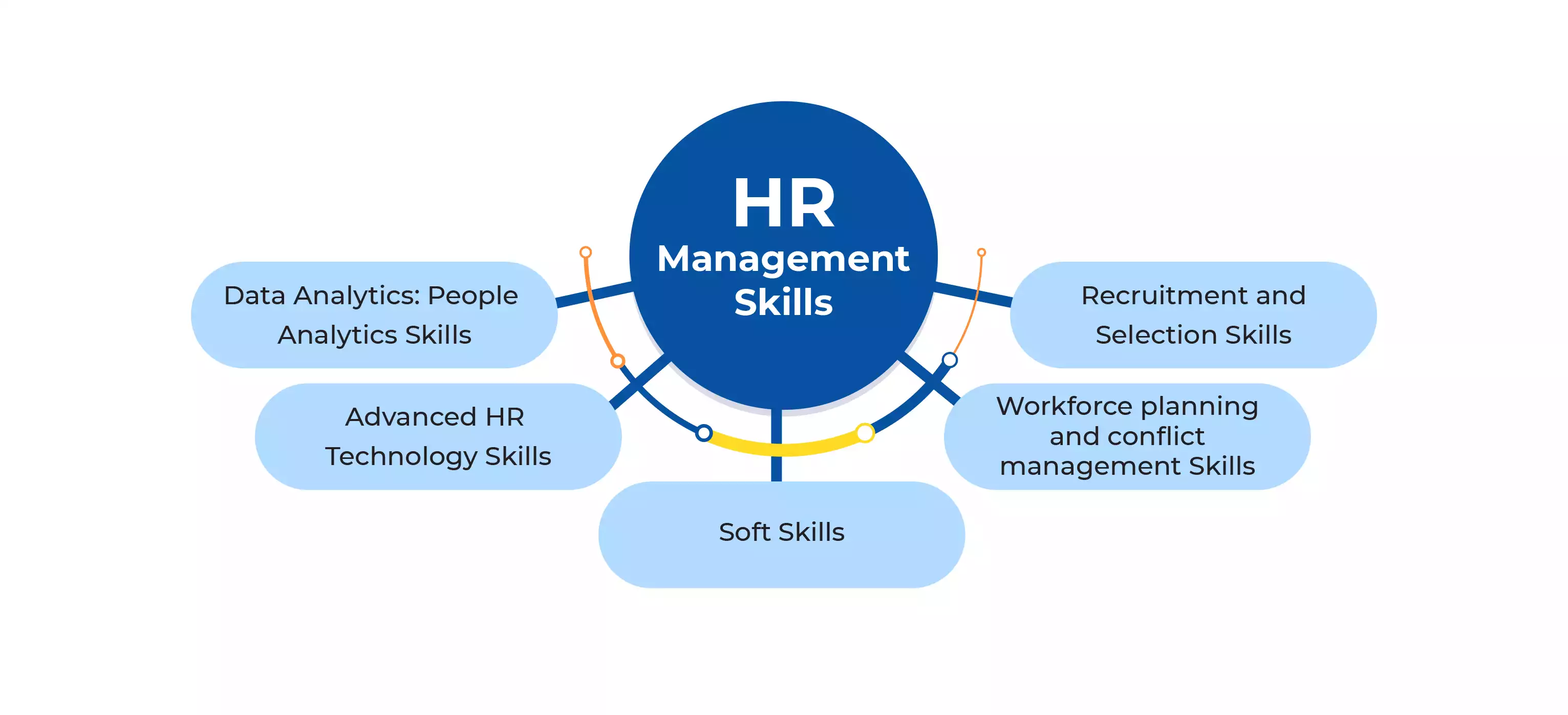 Neena Raj
May 13, 2025
Neena Raj
May 13, 2025

A good HR Manager should possess a wide variety of Human Resource Management Skills to perform their duties well. HR professionals work in almost every sector, and knowing what HR skills are highly in demand helps you prepare for a successful career in this field. Today, some of the top Human Resource Management skills include effective communication, HR analytics, conflict resolution, talent management, employee engagement, performance management, organisational development, recruitment and selection, strategic thinking, and knowledge of labour laws and compliance.
Today, Human Resource Management (HRM) plays a critical role in shaping organisational success. According to Deloitte's "2025 Global Human Capital Trends" report, navigating modern workplace tensions requires HR leaders to blend traditional expertise with new-age skills. So, if you want to start a high-paying career in the human resource sector, then take a look at the essential HRM skills.
According to the Bureau of Labour Statistics, the employment of human resources managers is projected to grow 6 per cent from 2023 to 2033, faster than the average for all occupations. The median annual wage for human resources managers was $140,030 in May 2024. The data predicts a promising future with opportunities for growth, influence, and attractive salaries.
But landing a high-paying job in HR requires you to have skills that make you an invaluable asset to any company. Take a look at the HR Soft Skills and technical skills that can help you secure those top-tier roles.
|
HR Soft Skills |
HR Technical Skills |
|
|
Strategic thinking and agility are crucial for HR professionals to ensure HR practices are aligned with business goals and can adapt to changing environments. There is a growing need for organisations to balance stability and agility, a concept termed "stagility."
This short-sighted view can lead to an imbalance between talent management and business needs, resulting in a workforce ill-prepared for future challenges. So if you want to lead your organisation to success, then start developing strategic thinking skills and agility.
Without Strategic Thinking and Agility, your HR practices may become transactional, focused on day-to-day tasks without considering the long-term implications. As businesses face uncertain markets, HR's ability to align workforce strategies with shifting organisational needs becomes crucial. Consider taking Strategic Succession Planning Training can equip you or your workforce with the necessary skills and expertise for success in senior positions.
Bridging the "experience gap" is a key theme in the Deloitte report. Many new hires are perceived to lack sufficient real-world experience. HR leaders must move beyond traditional degree-based hiring and embrace skills- and potential-based recruitment and development practices. This approach not only fills roles faster but also fosters a diverse, dynamic workforce ready to tackle evolving challenges.
Reimagining the role of managers is imperative. While 73% of organisations acknowledge the need to redefine managerial responsibilities, only 7% have made significant progress. HR must now focus on cultivating leaders who can integrate technology while maintaining a human-centred approach to team management. Strong, empathetic leaders drive engagement, retention, and performance in today's hybrid and AI-enhanced workplaces. Consider investing in high-quality leadership training to sharpen your skills and meet these demands head-on.
In the tension between agility and stability, conflicts are inevitable. HR professionals need advanced conflict resolution skills and the ability to foster cultures that prioritise continuous learning, inclusivity, and psychological safety. A healthy organisational culture boosts innovation, enhances collaboration, and supports long-term business resilience.
One of the critical competencies for HR professionals is the ability to anticipate future demands. You can deal with potential personnel issues if you have the expertise to predict future needs. Due to companies’ increasing desire for workers with a diverse set of abilities to satisfy their needs, the workforce is changing.
HR professionals will need to develop their workforce planning skills in the future. You can select the best candidates with the proper skills by evaluating the skill gap and comprehending the ability needed. The more precise your workforce plan, the more equipped you are in case of a shortage or a position that needs to be filled immediately.
Recruitment and selection are other frequently stated HR competencies. One of the most crucial HR duties is to locate suitable candidates, choose the best, and assess whether there is a fit between the candidate, the company (culture), and the management.
The HR skill of recruitment marketing combines tactics and resources to find and develop exceptional people. The organisational ideologies, brand values, and attractive packages can be promoted in this way to draw upon potential recruits. Social networking sites on the internet can also be used for marketing.
If your intersested in woking in this specialisation, then consider getting Interviewing & Recruitment Training to acquire the skills to hire the right employees for the organisation.
Organisational culture is the very core of a company. It refers to the practical and pervasive implementation of norms, best practices, ideals, and shared values within your company. Your culture defines and shapes your work environment. Ultimately, developing your organisational culture is about building people programs to help you achieve your business goals while remaining in line with your company values.
Knowledge of labour laws and compliance refers to the understanding and application of legal regulations that govern the relationship between employers and employees. Knowledge of labour laws and compliance is crucial for HR professionals. It's essential for ensuring legal compliance, avoiding penalties, maintaining a positive work environment, and fostering employee trust. HR professionals need to stay updated on labour laws, regulations, and best practices to avoid legal issues and ensure fair treatment of employees. For instance, if you are looking to work as an HR professional in Dubai, then having UAE labour law training is a must.
Business acumen is a crucial skill for HR professionals, encompassing a deep understanding of how an organisation operates and generates revenue. This knowledge allows HR to align its strategies with the overall business goals, ensuring that human resource policies and practices effectively support the organisation's objectives and enhance customer satisfaction. Key Components of Business Acumen include financial literacy, strategic alignment, interpersonal skills, problem-solving Ability
Training and development programs are systematic efforts within an organisation to enhance employee skills, knowledge, and abilities, ultimately improving job performance and career growth. These programs can address various needs, from basic onboarding for new hires to specialised technical skills development or leadership training. HR professionals are primarily responsible for designing, implementing, and managing training and development programs. This includes identifying training needs, developing programs, and evaluating their effectiveness.
The increasing digitalisation of the HR field demands that HR managers be tech-savvy. As a result, possessing and being proficient in certain technical skills is crucial. A successful HR Professional leverages HRIS, ATS, performance management systems, and more to enhance efficiency and make data-driven decisions. Take a look at some of the top HR Technical skills.
The above-mentioned skills are essential to becoming an expert in Human Resources. These abilities are required for HR professionals to manage their time and stay organised while meeting work objectives. The HR Certification course is a great way to equip yourself with the latest skills in HR Management. The CHRM and CHRP courses are popular HR Certifications out there. You can choose the proper certification according to your career needs.
HR skills will keep changing as technology keeps changing as well. This is because companies will eventually have to evolve and will only recruit professionals who are evolving on our revolving planet. In the meantime, having these five essential abilities will help you better function, manage, and track organisational growth and the acquisition of new employees.

Neena Raj is an expert trainer with 24 years of experience in enhancing organizational performance through HR, soft skills, and productivity training. Her areas of expertise include organizational behavior and team dynamics, cross-cultural communication, performance management systems, and life coaching and development.
Neena has an MBA in Sales and Marketing from Loyola College, a Diploma in Psychological Counselling, and is currently pursuing a PhD in Psychology. She is also a Certified NLP Trainer and holds several other certifications, including Certified Human Resource Professional (CHRP), Certified Human Resource Manager (CHRM) and Total Quality Management Certification.
Her specialisations include public speaking, emotional intelligence training, Time Management, Leadership Skills and UAE labour law. Neena has delivered public speaking training for many of Dubai’s leading companies and government entities, including the Dubai Health Authority (DHA), Emirates Airlines, DP World and Dubai International Hotel.